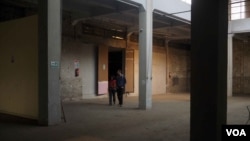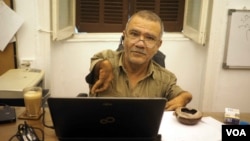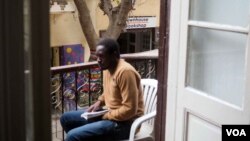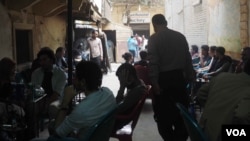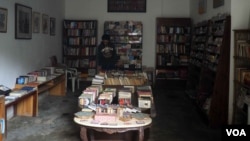It took three hours to shut down the Townhouse Gallery in late December, and staff members were stunned.
“About 25 or 30 people stormed into the place without telling us who they were,” says Yasser Gerab, the spokesman and co-owner of the gallery. “They barged in without even asking who is the manager.”
Authorities shut down the prominent gallery for violations of vague and changing regulations, according to Gerab, who is hoping to reopen his exhibition space “soon.”
Some artists say the reopening of the gallery is not likely to signify a reversal of Egyptian policies that have quieted a wide range of Egyptian artists, writers, journalists and activists through self-censorship.
“There are known red lines that are good ways to get attention from the state,” says David Degner, a photojournalist who has been working in Egypt for six years.
Sensitive topics - code for criticism of the government - are for the most part simply avoided in Egypt's art world these days, according to Degner. At the same time, local media stick to stories that are almost exclusively pro-government.
“There’s not much more that can be clamped down,” he says.
Revolution anniversary
In the Townhouse administrative office, co-owner Gerab carefully expresses his complaints, never suggesting his gallery was closed for political reasons.
The gallery was closed because of missing permits that were previously not required and failing to follow fire code regulations they didn’t know existed. Gerab says they broke other “rules,” like needing a permit to film an arts workshop for their in-house archive, because they had no idea they existed.
Over the past two months, he adds, he has been working with the government departments that shut down the gallery to comply with the laws. He even praises authorities for their attention to fire safety.
“The performance before the current administration was a little lazy,” he says.
The gallery, which has operated in Cairo since the late 1990s, was never known for displaying art controversial enough to upset authorities, according to artists.
Activists’ den
It is widely believed, however, that the gallery was closed because of the kind of clientele it attracted: young ‘activist types.’ Several coffee shops that catered to similar groups were closed at roughly the same time as the gallery ahead of the anniversary of the 2011 uprising on January 25, which remains a highly controversial event.
“The Revolution,” as it is known in Egypt, toppled then-president Hosni Mubarak and two years of upheaval followed, culminating in a violent standoff between rival factions in 2013. Hundreds of people were killed and thousands were injured and the clear victor, then-defense minister Abel Fattah el-Sissi, became Egypt’s de-facto president, prior to his formal election the following year.
Since then, Egyptian people have reverted to many pre-revolution customs, like avoiding criticizing authorities in public for fear of retribution. Tens of thousands of activists and supporters of the now-banned Muslim Brotherhood are now in prison, according to Amnesty International.
In the weeks leading to the anniversary this year, authorities warned that protest bans would be enforced on January 25 and heavily-armed police patrolled 2011 activist hotspots, like Tahrir Square.
The only ‘protesters’ who showed up in the square that day said they were there to support the government, showering the police with flowers and praise.
“I wish to shake hands with President Sissi because I love him so much,” said Mohamed Elkhons, a truck driver in Tahrir Square on January 25. “In fact, I love him more than my sons.”
Future for arts
Looking towards the future, some Egyptian artists say they prefer to display their work independently because all government-sanctioned galleries are, at the least, self-censoring their exhibitions.
“I never participate in any event in this country because it is always censored,” says Ammar, an Egyptian graffiti artist. “Art is judged solely by politics, not if the work is good or not.”
At the gallery, however, young people crowd in the nearby café and already the Townhouse bookstore has reopened. One gallery worker, Nahla, says the work of young ‘edgy’ artists has become more and more popular in the years since the revolution, and refusing to comply with the new and varied regulations would crush the momentum.
“I hope Egypt will have more cultural places,” she says. “The country will be better for the upcoming generation.”




